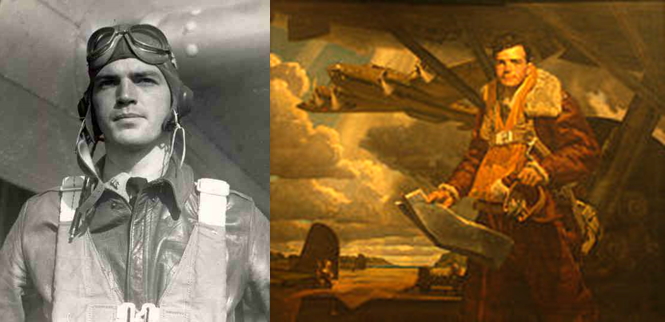Capt. Colin Purdie Kelly, Jr.

Colin Purdie Kelly, Jr. (/ˈkoʊlɨn/; July 11, 1915 – December 10, 1941) was a World War II B-17 Flying Fortress pilot who flew bombing runs against the Japanese navy in the first days after the Pearl Harbor attack. He is remembered as one of the first American heroes of the war for sacrificing his own life to save his crew when his plane became the first American B-17 to be shot down in combat.
Kelly was born in Madison, Florida in 1915 and graduated from high school there in 1932. He went on to West Point in 1933, graduated in the Class of 1937, and was assigned to a B-17 bomber group. He was the first Army officer to fly the Boeing Flying Fortress in the Far East.
On December 10, 1941, Kelly’s B-17C, USAAF 40-2045, (19th BG / 30th BS), took off from Clark Field in the Philippines. During its bombing run, Kelly’s plane hit the Japanese cruiser Natori. On its return flight, the bomber came under attack by Zeros from the Tainan Air Group, one of which was piloted by famed Japanese flying ace Saburo Sakai. Kelly stayed at the controls of the badly-damaged aircraft so that the surviving crew members could bail out. Just as he and his co-pilot attempted to escape, the plane exploded, ejecting both men. Kelly’s co-pilot, Lieutenant Donald Robins, was able to open his parachute in time. Kelly hit the ground, parachute unopened.
Early reports misidentified the Japanese heavy cruiser Ashigara, which was present, as the battleship Haruna, which was not, and also mistakenly reported that Kelly had crashed his plane into the smokestack of Haruna, becoming the first suicide pilot of the war. Many highly reputable sources, including Webster’s New Biographical Dictionary, still continue to report, though, that Kelly bombed and sank a Japanese warship either the Japanese battleship Harunaor the cruiser Natori or the Ashigara and that the date of the bombing was December 9, 1941 and not December 10, 1941. While initial reports were that the ship was sunk that has not been confirmed while Kelly’s crew confirms the ship was heavily damaged
For his extraordinary heroism and selfless bravery, Kelly was posthumously awarded the Distinguished Service Cross. Kelly had earlier in peace time also been awarded the Distinguished Flying Cross.




